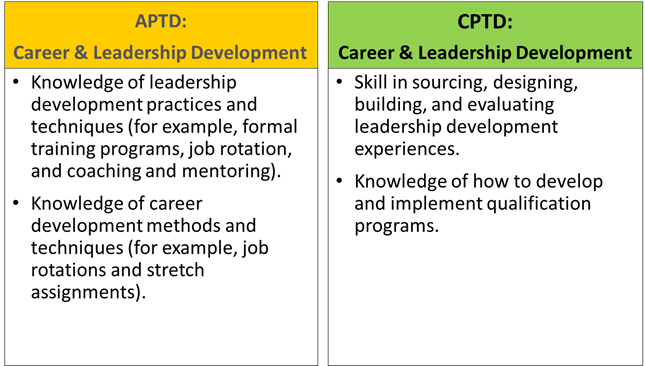ATD Blog
The APTD or the CPTD? That Is the Question
Tue Oct 12 2021

If you have decided you want to pursue an ATD credential but are unsure whether the Certified Professional in Talent Development (CPTD) or the Associate Professional in Talent Development (APTD) is right for you, I may be able to help. As a credential holder, previous manager of the ATD career development community, and editor/author of Find Your Fit: A Practical Guide for Landing a Job You’ll Love, I have had dozens of similar conversations with potential certification candidates and can speak about this choice on personal and professional levels.
Think about your answers to these questions:
What are your career goals? The first thing to determine is what you would like to do next in your career. Are you hoping to take on different responsibilities at work? Do you aspire to hold a managerial position? If you’re unsure about what you want to do next, you need to think it through before deciding which credential to pursue.
Are you eligible? Both certifications have eligibility requirements because they are designed for professionals who already have experience and knowledge in the field. They’re not designed for people who are just starting out or who want to get into the profession.
To be able to sit for the APTD or CPTD exams, you need work experience, and you must have completed professional development in key areas covered on the exam.
Work Experience
How much experience do you have? To qualify for the APTD or CPTD exams, you need to have professional experience in learning and development or related functions such as human resources. CPTD candidates must have at least five years, and APTD candidates must have at least three years of work experience to qualify. The amount of time you spend on talent development activities is not specified, but you should have some experience across various functions.
What type of experience qualifies? You need to have worked with adults on activities related to the capabilities described in the Professional and Organizational domains of ATD’s Talent Development Capability Model. We’ve listed the type of activities that your work experience should include in Figure 1. Check out the details under each topic by exploring the interactive capability model site.
FIGURE 1

Professional Development
Have you done any professional development for yourself lately? For the APTD, you need to have completed 28 hours of professional development in the past three years. For the CPTD exam, you need at least 60 hours of professional development in the past five years.
What type of professional development qualifies? Professional development activities must be verifiable, at least 30 minutes long, and relate to the topics in Figure 1. For more information about the type of professional development that qualifies, watch the short video on this webpage or review this infographic.
Do you have broad-based or focused experience? Has your experience been focused on one or two main areas of expertise, such as training delivery or instructional design, or have you worked in many different areas across the talent development spectrum? Many people describe the APTD exam as best suited for individual contributors and the CPTD exam as most appropriate for those with more strategic or leadership experience.
The APTD exam focuses on the knowledge you need to have gained after working for at least three years in the field. You must understand the concepts well enough to be applied at work, which is why your work experience is so important. The CPTD exam targets knowledge and skills needed at the five-year mark and beyond. It heavily emphasizes application and professional decision making and has a deeper focus on organizational capabilities.
An example of the differences between the type of content covered on the two exams can be seen in Figure 2. The APTD and CPTD exams include questions about career and leadership development. However, the APTD exam focuses on your knowledge of the types of leadership development techniques, while the CPTD exam emphasizes full implementation of a leadership development program.
Figure 2

If you are eligible to take either one of the exams, the best way to decide is to review this comparative content outline for both exams or complete the gap analysis that can be found in the APTD and CPTD handbooks.
What type of test taker are you? Another consideration is your comfort level with taking a timed test. The APTD and CPTD exams are computerized and taken in a secure test center or closely monitored online environment. When I was considering which credential to pursue, part of my decision was driven by the fact that I had not taken this sort of exam in quite a while.
The APTD exam is a two-hour, multiple-choice exam with 115 questions. There is only one correct response, and you have an opportunity to review your answers before submitting your exam.
The CPTD exam is a three-hour exam with two portions: one multiple-choice section and another with multipart case management-style questions.
The multiple-choice questions are both knowledge and practice-based. As with the APTD exam, you may review and change your answers at the end of that section of the exam.
The case management questions are a bit different. They pose a scenario then ask you to determine what actions should be taken at each step in the process. You will need to rely on your experience and professional judgment to answer the case management questions correctly. For this portion of the exam, you cannot go back and change your answers.
How much time do you have to devote to preparing for the exam? Another key factor in your decision is the amount of time you can devote to preparing for the exam. It takes time to study and take the exam. Before you make a final decision, make sure you have room in your schedule to complete this goal. APTD candidates report studying between 60 and 80 hours, and CPTD candidates say they study between 80 and 120 hours for the exam.
How will you pay for the exam fees? The final consideration will be the money you have available to invest in your professional development. If your employer supports your certification, take advantage of any funds that can be applied to preparation and exam fees. For more information about how to convince your employer, review this recent webinar.
The APTD exam fee is $499 for ATD members and $699 for nonmembers.
The CPTD exam fee s $975 for ATD members and $1,350 for nonmembers.
Which one is right for me? Only you can determine which certification is the best fit for you, but here are a few last thoughts on the subject.
Associate Professional in Talent Development (APTD): Even if you technically qualify to take the CPTD exam, you may want to consider the APTD exam. If your experience is focused in a few areas of knowledge or if you have little exposure to the organizational capabilities that are tested more heavily on the CPTD exam, the APTD may be the right choice. Many professionals who take the APTD exam have far more than three years of experience.
Another advantage to taking the APTD exam first is that you can use it to fulfill the professional development requirement for the CPTD exam, should you decide to pursue it in the future. APTD certification can also be used to satisfy one year of the work experience required for the CPTD exam.
Certified Professional in Talent Development (CPTD): If you have years of experience in a wide range of the topics covered on the exam**,** the CPTD may be your best choice. If you are in a management role, aspire to a management position, or hope to build a consulting practice in the future, the CPTD may be most appropriate for you.
For more information, you may want to listen to one of these recent webinars or download a candidate handbook from the active candidates page. To network with others who are pursuing certification, join one of these LinkedIn groups:
Pursuing an ATD certification is a challenging but rewarding experience. Join the next group of elite candidates to achieve an ATD certification.
Still not sure which certification is right for you? Browse additional frequently asked questions or sign up for an upcoming call with ATD CI staff or current credential holders here.
